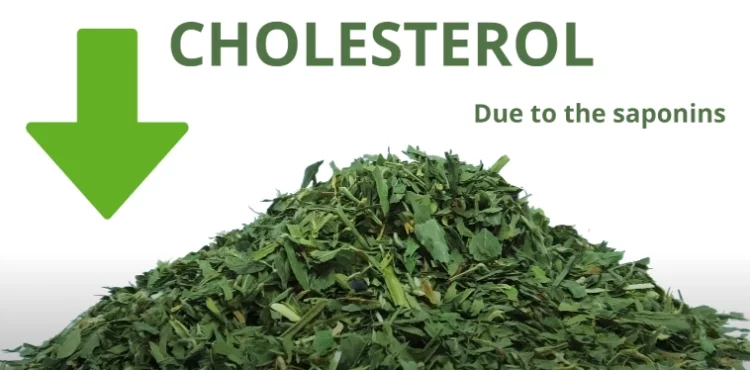reviewed by Christina Lopez
Alfalfa is a perennial plant known as Medicago sativa, Buffalo herb, Sanfoin, Purple medic, Mu Xu and Lucerne. This plant has been grown to feed livestock for millions of years. The perennial plant belongs to the Fabaceae (legume) family, but it has been considered an herb utilized in making traditional medicine for a very long time. The medication made from alfalfa is used to treat various health conditions.
Alfalfa is taken as a supplement to treat many human health conditions like high cholesterol, urinary tract infection, diabetes, menstrual issues, arthritis, and many other disorders. Because alfalfa is long prized for its significant content of proteins, other minerals, and vitamins compared to some other sources.
Contents

When fresh alfalfa in the form of sprouts is eaten or consumed, it tastes grassy, bitter, and sweet. Its dried leaves and seed are taken as a supplement, or the seeds are sprouted and eaten directly. Alfalfa originally came from Central Asia and the South, but it has grown worldwide for decades.

Typically alfalfa is taken as alfalfa sprouts or herbal supplements because the seeds and the leaves are available only as an herbal supplement and not as an everyday food. There is no official, or standard nutritive information or content is available.
However, alfalfa seeds are an excellent source of Vitamin K and various nutrients, including Copper, Vitamin C, Folate, and Manganese. Alfalfa sprouts also contain the same nutritional contents, and it also has a low level of calories.
For instance, one cup of alfalfa sprouts (33 grams) contains only eight calories. Apart from that, it also carries the following nutrients:
There is a high level of bioactive plant compounds present in alfalfa. The plant compound includes coumarins, alkaloids, phytoestrogen, saponins, phytosterols, and flavonoids.
Summary
Alfalfa contains Vitamin K and many other minerals and vitamins in small amounts. It also has a high level of various bioactive plant compounds.
Alfalfa is a nutrient-dense and low-calorie food. According to the Nutrient Database by USDA, one cup of alfalfa has 0.2 grams of fat, eight calories, 0.6 grams of fiber, 1.3 grams of protein, and 0.7 grams of carbohydrates. Eating alfalfa will aid in weight loss because of increased satiety, a feeling of fullness.
Beyond the dietary uses of alfalfa, it is also used in alternative therapies to treat various metabolic disorders and medical conditions. But this claim is not supported by scientific evidence.
Alfalfa has the ability to lower your blood cholesterol level, and it is the best health benefit of alfalfa to date. Alfafa has saponins, a substance that binds the cholesterol to the body's bile salts, reducing the serum level of cholesterol.
Animal studies conclude that alfalfa has a direct association with reducing blood cholesterol levels in rats and increasing the dose of saponin extracts of alfalfa.
This lowering of cholesterol is because of the absorption of cholesterol in the stomach and increasing the discharge of cholesterol-forming compounds. This achievement of this effect is somehow uncertain in human beings. But Alfalfa has been deputized as the potential treatment agent for high cholesterol disorder (hypercholesterolemia). But further research is required to understand the relative dose used in rats can be used in humans or not.

Alfalfa is a fiber-rich food that provides significant help to control blood sugar. It is done by lowering the absorption of glucose inside the intestines. As a result, alfalfa might help treat prediabetes or diabetes. The evidence of such treatments, albeit scant, is present in some animal studies.
There is little evidence that such benefits of alfalfa can also be achieved in humans because further research is required.
Alternative healthcare providers claim that alfalfa plays a part as a natural diuretic, which means a "water pill." They believe that alfalfa is used to treat various urinary tract disorders, including (UTIs) urinary tract infections, and kidney stones (renal calculi).
But like the other treatments, this treatment by alfalfa for kidney stones and urinary tract infection is uncertain to be accurate.
Alfalfa has phytoestrogens which is a plant-based hormone that imitates the action of estrogen, a female hormone. Many herbalists assert that alfalfa could be a remedial treatment for some menstrual disorders like (PMS) premenstrual syndrome.
There is insufficient evidence available that shows that the estrogenic effect is strong enough to give any benefit. Compared to that, there is even inadequate evidence available that alfalfa has some role in treating and preventing osteoporosis in women who have postmenopause, breast cancer, and menopause symptoms.
A significant amount of test-tube studies claimed that alfalfa deploys potent anti-inflammatory results by subduing the production of cytokines, an inflammatory compound.
Various alternative healthcare providers consider that this anti-inflammatory effect will reduce the inflammation and pain associated with rheumatoid arthritis and osteoarthritis. In fact, alfalfa is one of the most used and popular ingredients in herbal arthritis remedies.
This beneficial claim remains unproven to date, especially with rheumatoid arthritis, in which the fundamental cause of inflammation is autoimmune. And this action is not altered by alfalfa.

Alfalfa has excellent antioxidant properties, as in some animal studies, it is observed that it prevents some oxidative stress damage that is caused by free radicals.
Alfalfa has the ability to diminish the DNA damage and cell death generated by free radicals. This is done by lowering the assembly of free radicals and maintaining and improving the body's power to fight against them.
The traditional use of alfalfa is to act as an antidiabetic, thus lowering the sugar level in the blood. This effect ultimately improves the body's metabolic health.

Alfalfa has multiple uses and benefits, including lowering the sugar level of the blood, controlling the cholesterol level, helping to reduce inflammation and pain of arthritis, helping with premenstrual syndrome and urinary tract disorders. But more studies and research is needed to conclude such beneficial effects are accurate in humans like they are accurate in animal studies.
Although alfalfa is considered safe to use for most people, it might result in some harmful side effects in some humans. Due to its high content of fibers, eating raw alfalfa sprouts may result in abdominal discomfort, diarrhea, and gas.
Alfalfa has estrogenic effects that should be avoided for hormone-sensitive pregnant women. Apart from that, raw alfalfa may cause salmonella, listeria, ad E.coli.
Alfalfa has a high level of Vitamin K that is beneficial for most people but may be dangerous for some. Because high intake of Vitamin K can result in the ineffectiveness of blood-thinning medications, people who take such medication should avoid significant alteration in their Vitamin K diet.
Alfalfa may cause the reactivation of lupus in people who take alfalfa supplements because of the immune-stimulating cause of amino acid L-canavanine that is present in Alfalfa.
Alfalfa may endanger pregnant women, people who take blood-thinning medication, and people suffering from a compromised immune system or autoimmune disorder.
You can use alfalfa as an alfalfa tea or consume powdered from alfalfa supplements as tablets. It is considered an effective and healthy dose as many studies were done on the benefits of alfalfa leaves and seeds.

The FDA does not fully regulate herbal supplements, so ensure to do complete research before buying from a renowned brand or manufacturer. In addition, you can take alfalfa seeds in smoothies and soups.

Apart from that, you can only incorporate alfalfa sprouts into your diet. There are many ways to do that, like you can take the alfalfa sprouts in a salad or sandwich.

 |
 |
 |
 |

About Christina Lopez
Christina Lopez grew up in the scenic city of Mountain View, California. For eighteen ascetic years, she refrained from eating meat until she discovered the exquisite delicacy of chicken thighs. Christina is a city finalist competitive pingpong player, an ocean diver, and an ex-pat in England and Japan. Currently, she is a computer science doctoral student. Christina writes late at night; most of her daytime is spent enchanting her magical herb garden.
 |
 |
 |
 |
Check These Out
Get new FREE Gifts. Or latest free growing e-books from our latest works.
Disable Ad block to reveal all the links. Once done, hit a button below
 |
 |
 |
 |